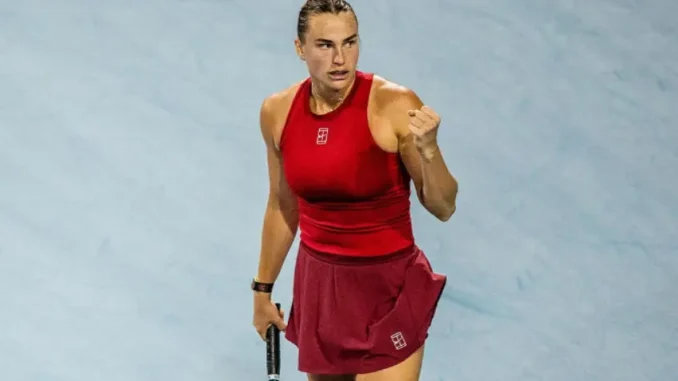
In the electrifying world of professional tennis, where every match tests the limits of skill and spirit, Aryna Sabalenka stands tall as a towering figure. The Belarusian powerhouse, currently reigning as the world’s No. 1 women’s singles player, has not only dominated with her thunderous serves and ferocious groundstrokes but has also emerged as a mental giant—a transformation that has captivated fans and analysts alike. As she prepares to defend her title at the Miami Open in late March 2025, Sabalenka has peeled back the curtain on the secret behind her remarkable psychological resilience, revealing a blend of introspection, independence, and relentless self-belief that has propelled her to the pinnacle of the sport.
Sabalenka’s journey to mental mastery hasn’t been a straight line. Early in her career, she was known as much for her emotional volatility as her raw talent. The 26-year-old once struggled to harness her fiery temperament, with outbursts and frustration often derailing her on-court performance. But those days feel like a distant memory now. Reflecting on her evolution, she’s candid about the hurdles she faced. “For many years, I was trying to figure out my emotions,” she’s admitted, acknowledging how advice to suppress her feelings—to mimic the stoic, “no-emotions” players—left her stifled and disconnected. It was a battle against her own nature, one she eventually won by embracing who she truly is.
The turning point came when Sabalenka made a bold choice: she parted ways with her sports psychologist. After years of collaboration that armed her with tools to manage her mind, she decided the real work rested on her shoulders alone. “At the end, the only thing that helped me is just myself,” she’s said, a statement that underscores her fierce determination to take ownership of her mental game. This wasn’t about discarding the lessons she’d learned—it was about trusting herself to apply them in the heat of competition. She stopped leaning on external fixes and started digging deep within, a shift that marked the beginning of her ascent to mental dominance.
That self-reliance has paid dividends. On the court, Sabalenka now exudes a composure that belies her explosive playing style. She’s learned to channel her emotions into fuel rather than firebombs, a transformation evident in her recent triumphs. Take her commanding run at the Australian Open earlier this year, where she defended her title with a straight-sets victory over Coco Gauff in the final. Or her masterful performance at the US Open last September, where she outlasted Jessica Pegula in a gripping showdown. These victories—her third and fourth Grand Slam titles—showcase a player who thrives under pressure, a far cry from the one who once faltered when the stakes were highest.
So, what’s the secret sauce behind this mental makeover? Sabalenka points to a simple yet profound realization: she doesn’t need to bottle up her feelings to be tough. “Calmness does not show mental toughness,” she’s declared, rejecting the notion that stoicism equals strength. For her, it’s about letting her emotions breathe—yelling at her team, smashing a racket (or playfully tossing it, as she insists happened at the US Open)—and then refocusing with razor-sharp clarity. “If I hold it all inside, I get too crazy,” she’s explained, describing how bottling up that intensity clouds her thinking. Instead, she releases it, resets, and roars back into the fray.
Her team plays a crucial role in this dynamic. Those fiery exchanges with her coaches, often caught on camera, aren’t just tantrums—they’re part of a system that works for her. “We have these emotional moments, and it works for me,” she’s noted, highlighting how her support crew absorbs her intensity and keeps her grounded. It’s a dance of trust and understanding, one that allows her to stay authentic while maintaining the focus needed to conquer the world’s best.
As Sabalenka storms through the Miami Open, her mental fortitude is on full display. She’s already breezed into the final, dispatching No. 6 seed Jasmine Paolini with a 6-2, 6-2 masterclass that showcased her clutch play—converting break points with surgical precision while fending off every challenge to her serve. Off the court, she’s even found a new lens for growth, studying her rivals’ mental moves under pressure. “I’m more looking into the mental side of the game,” she’s shared, a hint that her evolution is far from complete.
At 26, Sabalenka laughs at the idea that she’s “getting old,” but her maturity is undeniable. Her secret isn’t a hidden trick or a magic mantra—it’s the courage to be herself, flaws and all, and the resolve to fix her own problems. As she eyes a Sunshine Swing title to cap her spring, the tennis world watches in awe, wondering just how high this mental giant can climb.
Leave a Reply